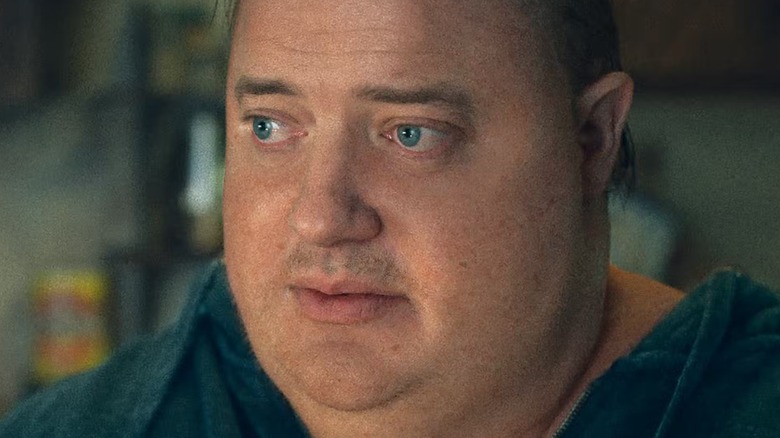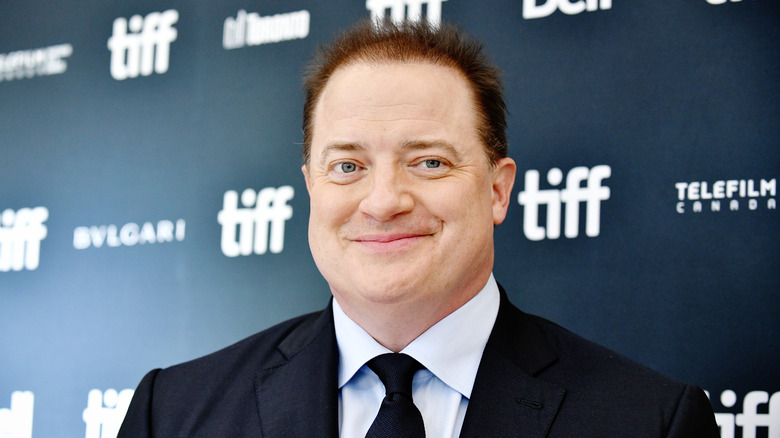The Whale Review: Disappointing Drama, Brendan Fraser Blameless
- Powerhouse performances from Brendan Fraser and Hong Chau
- Strong ensemble cast
- Uneven script
- Overwrought directorial choices
If you could bottle up the feeling of pure self-loathing, it would probably look something like "The Whale." Billed as Brendan Fraser's epic return to Hollywood (momentarily disregarding the several other high-profile roles he's taken over the past few years), it's difficult not to root for him as he puts everything he has into the role of Charlie, a man whose pain has led him to reach a weight incompatible with life. But although Darren Aronofsky's "The Whale" occasionally touches on the profound, it seems too laser-focused on Charlie's misery to create a fully developed narrative.
Charlie is 600 pounds, he's nearing the end of the life, and his world has never been smaller. He works as a writing instructor, conducting classes via Zoom, where he always has convenient excuses for leaving his camera off. He spends every day inside his apartment, traveling from couch to kitchen to bed with the use of a walker. His only company is Liz (Hong Chau), a nurse who stops by every day to bring him food, check his vitals, and provide some much-needed human interaction.
They try to ignore his declining health, but it becomes clear to both of them that he is suffering from congestive heart failure, and that he has very little time left. With that in mind, he sets his sights on righting the great wrong of his life: the broken relationship between him and his teenage daughter Ellie (Sadie Sink), who turns up on his doorstep as if by providence after being suspended from school.
Throughout the film, which was screened at the Toronto International Film Festival, we are struck by his limitations. They overpower him, as he struggles not just to stand up without aid, but to make the sort of grand gestures he so desperately wants to accomplish to give his life meaning. He can barely walk, so his efforts are constricted. He wants to see his daughter again. He can't fix their relationship — that's too big — but he can plant a seed to encourage her to see herself the way that he sees her.
Brendan Fraser's masterpiece
"The Whale" is one of those films that truly wouldn't work without the lead performance. As Charlie, Brendan Fraser is so open and vulnerable and honest, bringing the earnestness and relentlessly kind demeanor that has defined his entire career. The film is critical of some of his worst excesses — there's a binge-eating sequence that showcases how much he's given up on life — but it's also empathetic in a way that very rarely contains the contempt so often implied by pity. We see him as a man who always tended to be on the bigger side, but in the face of grief and regret, his weight gets out of control.
Fraser's character is a man defined by self-loathing — he is constantly apologizing for his mere existence. He's a massive presence on screen, but he is constantly making himself small — hiding from the pizza delivery man, almost ritualistically saying "I'm sorry" to Liz, begging his daughter to spend a few more minutes with him before storming out of the room. In spite of this, Fraser finds moments to inject much needed lightness to the proceedings. When Liz manages to procure a plus size wheelchair for him, he spends a minute zipping around his living room with childlike glee.
Less than the sum of its parts
As great as Brendan Fraser is in this role, and as much as he puts into it, there's something about "The Whale" that doesn't quite work. There's nothing wrong with the performances, per se — far from it. Hong Chau in particular is transcendent, full of love and empathy and rage. If Fraser is in Oscar conversations, Chau, as his best friend and the only person who understands his pain, deserves to be right alongside him.
Their younger costars fare less well. It's hard to fault Sadie Sink, who has a role where she's given little to do but rage, and Ty Simpkins as a young missionary is perfectly adequate as a true believer disillusioned by the church. But it feels as though there's something not quite fully formed about either of them, in terms of their characterization or their narrative arcs. "The Whale" doesn't fully engage with Ellie's trauma or Thomas's complicated relationship with fundamentalism. It chooses to focus all of its attention on Charlie, which is fine, but it makes parts of the third act feel unsatisfying from a narrative perspective. Ellie in particular lacks nuance — she lashes out at everyone who gets close to her, but without the shades of gray that make her character anything less than exhausting.
What's perhaps even worse is Aronofsky's tendency to create visuals that are frustratingly overwrought. In a dramatic moment, his impulse is to go over the top rather than exercise restraint, taking something that might be genuinely moving and giving it a distracting sense of clownish artificiality. The film seems obsessed with the fat suit that aids Fraser's performance, determined to put it through its paces after going to the great expense of creating it. But there's a lot more to Charlie than his weight, a fact that is supported by the script but not necessarily by Aronofsky's direction.
"The Whale" lives and dies on the strength of Brendan Fraser's lead performance, and there are few actors who deserve a career resurgence as much as he does. It's just a shame that there isn't more here beyond its function as a star-remaking vehicle. "The Whale" tries its best, and components of the film work extremely well in isolation. But like an English essay produced almost entirely on hot air, it isn't nearly as meaningful as it thinks it is.


